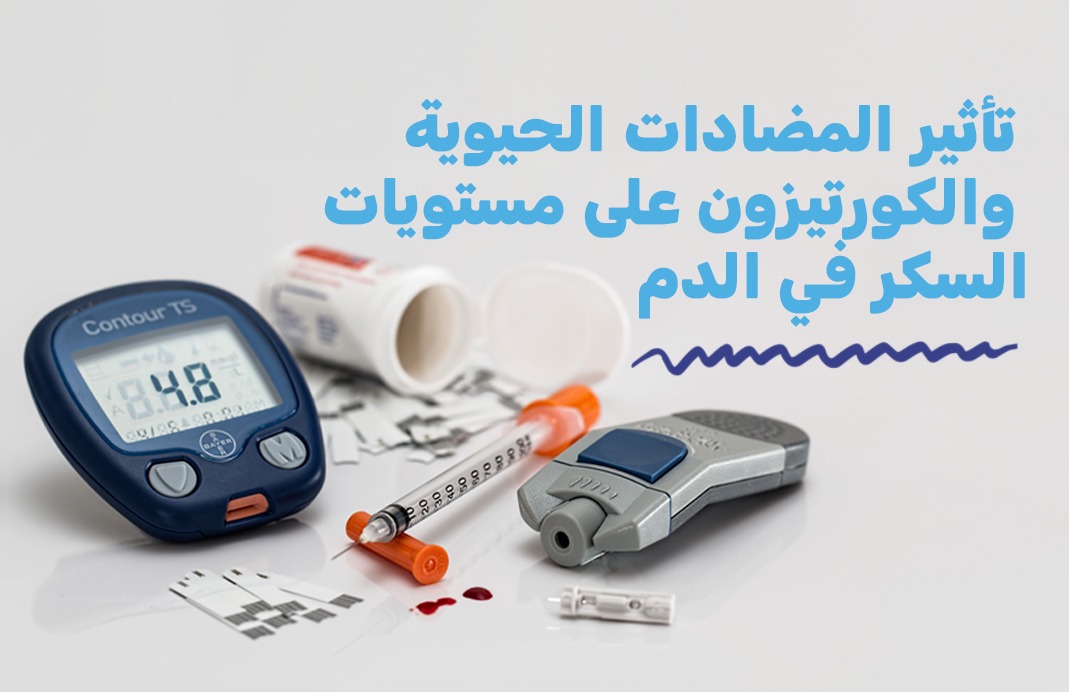Managing blood sugar levels is crucial for diabetic patients, as various factors, including medications used to treat other conditions, can influence glucose balance. Among these medications, antibiotics and cortisone stand out as factors that can directly or indirectly affect blood sugar regulation.
First: The Effect of Antibiotics on Blood Sugar Levels
Antibiotics are used to combat bacterial infections, but some types may affect blood sugar levels in different ways:
1. Indirect Impact via Insulin Resistance
- Some antibiotics affect the gut microbiome, a collection of beneficial bacteria that play a role in metabolism and insulin resistance.
- When these bacteria are disrupted, insulin resistance may increase, leading to elevated blood sugar levels.
2. Direct Impact of Certain Antibiotics
- Some drugs, such as fluoroquinolones (e.g., ciprofloxacin and levofloxacin), may cause episodes of hypoglycemia or hyperglycemia, particularly in patients with type 2 diabetes.
- These antibiotics may interfere with the function of pancreatic beta cells, which produce insulin, or enhance glucose metabolism in the liver.
3. Increased Risk of Infections and Their Effect on Blood Sugar
- Infections often cause a rise in blood sugar levels due to the body’s immune response, making glucose monitoring even more critical while taking antibiotics.
Second: The Effect of Cortisone on Blood Sugar Levels
Cortisone (corticosteroids) is an anti-inflammatory medication used to treat various conditions, such as asthma, arthritis, autoimmune diseases, and allergies. However, it can significantly impact blood sugar levels, especially with long-term use.
1. Increased Insulin Resistance
- Cortisone reduces cellular sensitivity to insulin, making the body less effective at utilizing glucose, leading to elevated blood sugar levels.
2. Stimulation of Glucose Production in the Liver
- Cortisone triggers the liver to produce more glucose, increasing blood sugar levels even during fasting.
- This effect makes blood sugar control more challenging, particularly for patients with type 2 diabetes.
3. Impact of Dosage and Duration of Use
- High doses or prolonged use increases the risk of persistent blood sugar spikes.
- Even low doses can affect glucose levels, though to a lesser degree, and individual responses may vary.
How to Manage the Effect of Antibiotics and Cortisone on Blood Sugar
1. Consult a Doctor Before Taking Any Medication
- Diabetic patients must inform their doctor about their condition before taking antibiotics or cortisone to adjust the dose accordingly or find alternatives with minimal impact on blood sugar.
2. Regular Blood Sugar Monitoring
- Patients should increase the frequency of blood sugar measurements while on these medications to avoid sudden spikes or severe drops.
3. Adjust Insulin or Oral Diabetes Medications
- Patients may need to modify their insulin dose or oral diabetes medications to counterbalance the drug’s impact on glucose levels.
4. Maintain a Balanced Diet
- Reducing the intake of simple carbohydrates and focusing on fiber-rich foods and healthy proteins can help mitigate the effects of these drugs on blood sugar.
- Drinking sufficient water helps reduce the burden on the kidneys and regulate glucose levels.
5. Engage in Physical Activity with Caution
- Physical activity improves insulin sensitivity, but patients should be cautious to avoid hypoglycemic episodes, particularly when taking antibiotics.
Conclusion
Although antibiotics and cortisone may be necessary for treating certain conditions, their impact on blood sugar levels cannot be overlooked, especially for diabetic patients. The key to managing this effect is regular monitoring, consulting a doctor, and adjusting lifestyle habits to maintain glucose balance and prevent potential complications.
References
- American Diabetes Association (2021). Corticosteroids and Blood Glucose Levels. [Online] Available at: https://www.diabetes.org [Accessed 5 Feb. 2025].
- Drucker, D. J. (2020). Mechanisms of Action and Therapeutic Applications of Glucagon-Like Peptide-1. Cell Metabolism, 27(4), pp. 740-756. DOI: 10.1016/j.cmet.2020.03.005.
- Hirsch, I. B., Brownlee, M., & Edelstein, S. L. (2019). Impact of Fluoroquinolones on Glucose Metabolism. Diabetes Care, 42(6), pp. 1058-1065. DOI: 10.2337/dc18-2301.
- Peters, K. R., Weinstock, R. S., & Engel, S. S. (2021). Steroid-Induced Hyperglycemia: Strategies for Management. The Journal of Clinical Endocrinology & Metabolism, 106(9), pp. 2501-2510. DOI: 10.1210/clinem/dgab412.
- Wright, G. D. (2020). The Human Gut Microbiome and Its Role in Antibiotic-Associated Metabolic Disorders. Nature Reviews Microbiology, 18(3), pp. 153-167. DOI: 10.1038/s41579-019-0314-1.



